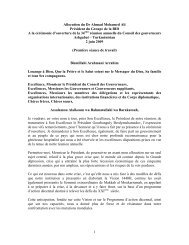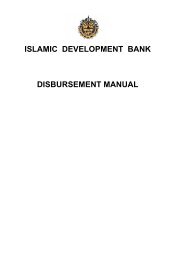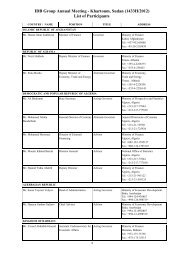Mauritania - Islamic Development Bank
Mauritania - Islamic Development Bank
Mauritania - Islamic Development Bank
Create successful ePaper yourself
Turn your PDF publications into a flip-book with our unique Google optimized e-Paper software.
transform the human development landscape of<br />
the Muslim world and restoring its dignity.<br />
53. The MCPS process of extensive consultations<br />
between IDB Group staff, the GoM, domestic<br />
stakeholders, and development partners<br />
underpins the proposed partnership strategy.<br />
These consultations have not only resulted in the<br />
diagnosis of the key structural constraints facing<br />
the economy but also an understanding on the<br />
areas of IDB Group intervention in the medium<br />
term, taking into account IDB Group’s mandate<br />
and comparative advantage and the roles of<br />
the other development partners. The MCPS<br />
framework also provides for a Results Matrix that<br />
should help the GoM and IDB Group staff monitor<br />
progress in the implementation of the MCPS<br />
across the range of interventions.<br />
2. Pillar I: Enhancing Human <strong>Development</strong><br />
Through Health<br />
2.1 Current Situation<br />
54. Human <strong>Development</strong> is central to<br />
<strong>Mauritania</strong>’s long-term future. As reflected<br />
in its poor rank (154 out of 182) in the multidimensional<br />
Human <strong>Development</strong> Index in<br />
2009, <strong>Mauritania</strong> faces challenges in many areas<br />
including education, lack of skills, health and<br />
malnutrition arising from poverty. The IDB Group<br />
will focus its efforts over 2011-2015 to help<br />
address the constraints <strong>Mauritania</strong> faces in three<br />
dimensions where the challenges are most acute<br />
— health (under this pillar), malnutrition through<br />
reduction in poverty and improvement in food<br />
security (under the second pillar) and capacity<br />
building as a cross sector theme.<br />
55. An increase in the allocation of funds to<br />
the health sector in <strong>Mauritania</strong> from about<br />
0.6% of GDP in 2000 to 3.8% in 2010, has led to<br />
improvement in access to health facilities but<br />
it is still insufficient to provide a basic level of<br />
essential services. The increases in resources<br />
have helped but are still below the level of US$13<br />
per capita, considered universally as the minimum<br />
level of expenditure necessary to ensure a basic<br />
level of essential services.<br />
56. The increased resources have helped to<br />
improve access to health services in urban and<br />
16<br />
rural areas but regional disparities remain.<br />
In urban areas, about 97% percent of urban<br />
population now lives within five kilometers of<br />
primary health services. The situation in rural<br />
areas has improved but on average only 45%<br />
of the population has access to primary health<br />
service within five kilometers. The rural average<br />
masks much more differences in access between<br />
urban and poor rural areas.<br />
57. In addition, the donor community has been<br />
providing substantial support to help <strong>Mauritania</strong><br />
fight communicable diseases including HIV/<br />
AIDS, Tuberculosis and Malaria and the country<br />
has made progress in this area. Because of these<br />
efforts, it appears that MDG 6, related to these<br />
diseases, may be achievable.<br />
58. However, child and maternal mortality<br />
remain at alarming levels (figures 11 – 12) due<br />
to widely perceived malfunctions of the health<br />
system and the associated lack of effective sector<br />
wide policy.<br />
MCPS for <strong>Mauritania</strong>, 2011-2015






